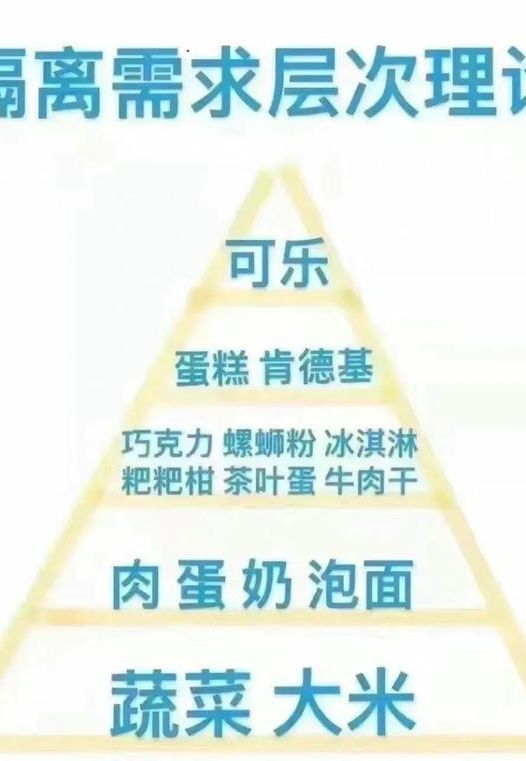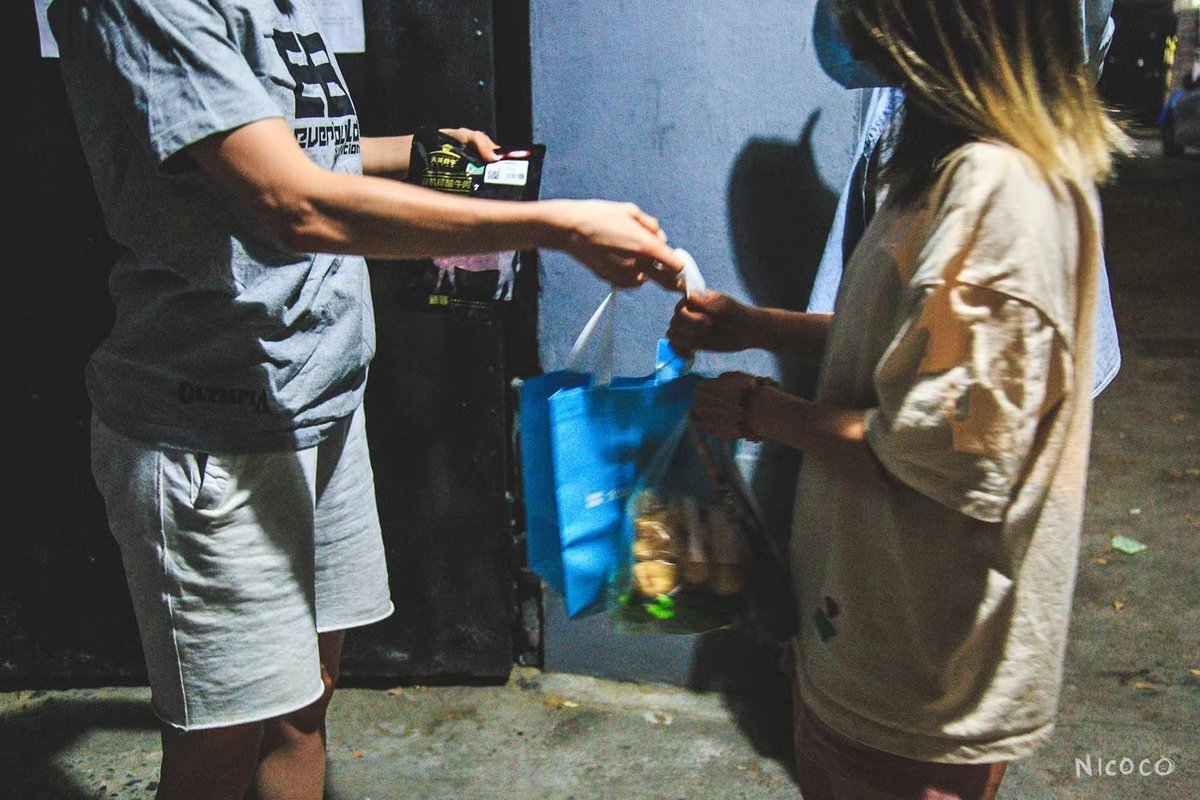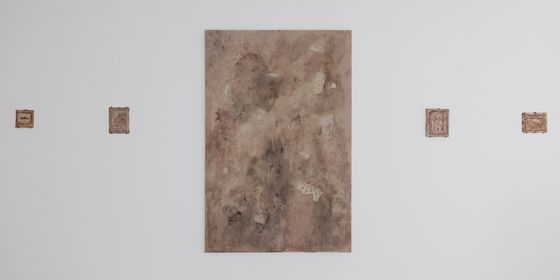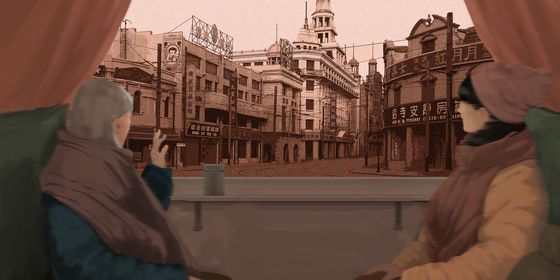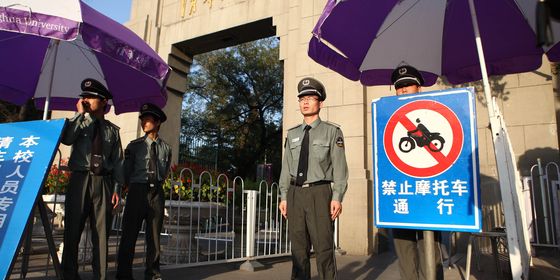Shanghai’s residents have turned to swapping supplies under lockdown—but is Coca-Cola really the most in-demand item?
“[Shanghai has] reached the age of bartering,” announced a bespectacled woman in a video on streaming platform Bilibili from April 10, swathed in a head towel and rubbing her shoulder, apparently in a state of complete exhaustion. “Money is now useless.”
Shanghai‘s extended lockdown, first announced for five days in parts of the city on March 28, left supply chains crippled by unexpected road closures and residents unprepared for the prolonged stays at home, as many had only bought food enough to last for one week. Inconsistencies in government-organized food deliveries, as well as a continued shortage of non-essential “luxuries,” means that locked down residents have turned to bartering: swapping whatever they have for whatever they need with their neighbors.
This grassroots bargaining economy, with countless variations across the city’s archipelago of closed compounds, has led to some novel market trends reflected in memes that circulated social media in the first weeks of lockdown. On April 8, in a post that has since gone viral, the Weibo account Jijin Jiaozhu listed food as if they were stocks: Vegetables were tanking as “some people are tired of eating them,” while vices like wine and cigarettes were a bullish market on the up. Bizarrely, Coca-Cola was dubbed the reserve currency that “can be exchanged for anything.”
Another meme shows a Maslow’s pyramid of foodstuffs people were craving. Vegetables and rice lie at the bottom, while cake and KFC are the nobility on the second-highest tier. Once again, Coca-Cola trumps the lot, at the very top of the pyramid.
These memes may be exaggerated, but there is a real hierarchy within Shanghai’s neighborhood bartering system—at least according to Maher Akil, a Lebanese sales director who has run a non-profit exchange group for around 150 residents in his apartment compound in Changning district. “At first everyone wanted vegetables,” he tells TWOC. But once people saw that fresh greens didn’t store well, non-perishables like frozen food, canned goods, and instant noodles came into demand.
The abruptness of the lockdown, and its considerable obstacles, made how to source food an urgent question. With many delivery drivers and logistics workers under quarantine, the system of quick buys and takeaways Chinese urbanites came to rely on for food came to a standstill. “There were not enough drivers, too many people [ordering],” says Jake Thornton, a Canadian businessman based in Shanghai’s Jing’an district, who wanted to be known by a pseudonym. He tells TWOC of repeatedly waking up at 6 a.m. to order groceries online—and on average succeeding just once out of every six tries.
Accusations of community volunteers blocking deliveries by private retailers like JD.com for fear of infection, or leaving donated food supplies to rot by the roadside, have exacerbated the shortage and the sense of scarcity among residents. Local authorities have been issuing handouts of essential foods, like vegetables and milk, but “I don’t think you can really only depend on the government handouts,” says Thornton, claiming irregular and unpredictable patterns of distribution across the city. Moreover, the supplies are allocated by household, meaning a large family or an apartment shared by multiple roommates would receive comparatively less per person.
And as the lockdown progressed, so-called “non-essential” supplies have become more and more attractive to people craving variety in their diets. To obtain these, as well as any basic supplies they lack for whatever reason, neighbors have organized together to make bulk purchases. Akil is one of his compound’s self-declared “group chiefs (团长)”—ordinary people who’ve volunteered to organize bulk purchases for their communities.
As a group-buy leader, Akil is responsible for managing a WeChat group where residents indicate the items they need, usually at the end of each day. He then places the orders, using a combination of delivery apps and calling up an individual in his compound who has started a small pop-up business selling snacks for a small profit. As for his personal purchases, he always buys more than he needs—like three kilograms of vegetables via delivery app Meituan on April 26—and lists the surplus items on WeChat to be traded for whatever he needs, or sold at half-price.
Not everyone in the city is able to foot the bill for such group-buys. Thornton says a box of vegetables can cost between 60 and 100 yuan per person, “I’d definitely say it is over what the regular market price would be for these items individually.” For people unable to wait for the next government food parcel and wanting to save on costs, bartering became a quick fix.
Once the compound’s basic needs for vegetables, meat, and rice were satisfied, demand moved to their wants—sweet things like cakes and chocolate—before moving up to the “sins,” as Akil terms them: alcohol and cigarettes.
That alcohol and cigarettes are Akil’s top tier suggests the levels of value are much more fluid than the pyramid meme suggests. Akil says the craze for Coca-Cola came in the early weeks, with people ignoring pictures of the snacks, shampoo, and other drinks he had posted on his compound’s WeChat group. “Everyone rushed to ask me what I wanted for the Coke,” he tells TWOC.
“It really comes down to what was lacking at the moment,” Akil tells TWOC, seeing an evolution in demand over time. Akil has personally traded two cans of Coke, with a bulb of garlic thrown in, for just one tin of Spam. He has also flogged one bottle for two lemons, two for four packs of instant noodles, and unspecified amounts for dishwasher soap and batteries.
Whatever is in shorter supply can become what he calls a “bargaining chip.” With their eyes on food in the immediate rush to supermarkets before lockdown, many residents forgot to pick up other basic supplies that slowly started to run out as the lockdown progressed. Toilet paper and laundry detergent accrued in value. When people could no longer get bread, yeast boomed.
But is there a special value to Coke? Practically speaking, it is long-lasting and takes up comparative little space. Also, unlike cigarettes and alcohol, there are relatively fewer people who will refuse Coca-Cola on health grounds. Nicknamed “happy water of fat nerds (肥宅快乐水)” online, Coke’s high sugar content may bring an adrenaline rush and a welcome distraction to stir-crazy residents. But Akil doesn’t feel it is significantly valued over other lockdown luxuries after the initial weeks, at least in his experience.
Intriguingly, at least according to the memes, Pepsi can’t be traded for anything. Akil confirms this, anecdotally: “I made the mistake of buying Pepsi and tried to use it as a bargaining chip,” he says, “and it was useless. I have a bunch of Pepsi here and nobody cares for them.”
He has been trying to get rid of them as a throw-in among other bartered items, but even this isn’t enough to tempt most traders. It seems something about Coke’s brand creates the value.
But still, the drink’s time as the gold standard in Shanghai’s bartering seems to be on the wane. “Coke had its moment, but right now people really don’t care,” says Akil. Now that people have stocked up on what they need, he believes, “it has lost its power.” Perhaps the real legacy of Coca-Cola’s reign in Shanghai’s lockdown economy will be as a symbol of this surreal chapter in the city’s history.
With contributions from Zheng Yiwen (郑怡雯)







